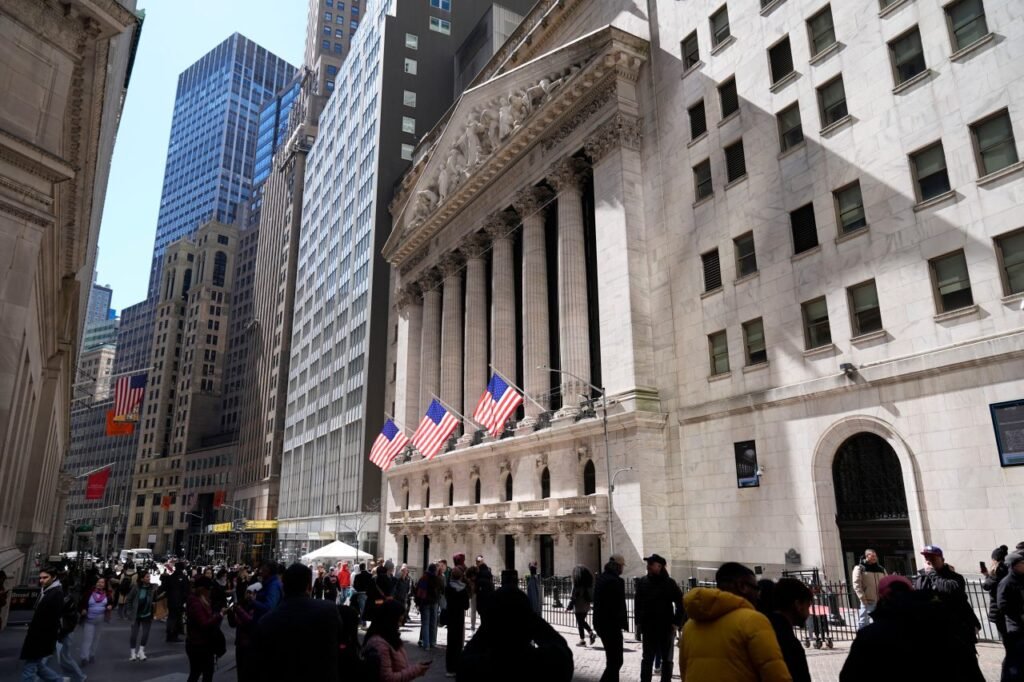Yuri Kageyama and Matt Ott, The Associated Press
12 minutes ago

FILE – A pedestrian walks in front of the New York Stock Exchange building on March 25, 2024 in New York. April 5, 2024, as investors focused on key U.S. jobs data to be released later in the day to gauge the health of the economy and see what action the Federal Reserve will take on interest rates. World stock prices were mostly down on Friday. (AP Photo/Frank Franklin II, File)
Wall Street pointed to modest gains in premarket trading Friday ahead of the U.S. jobs report that could influence the Federal Reserve’s next interest rate decision.
Dow Jones Industrial Average futures rose 0.3% before the bell, while S&P 500 futures rose 0.4%.
These small gains come after a decline this week. Markets fell sharply on Thursday, triggered by comments from Federal Reserve officials who indicated they may not cut interest rates this year if inflation worsens. Minneapolis Fed President Kashkari said he doubts the need to cut interest rates if many areas of the economy appear to be strong despite high interest rates.
The Federal Reserve is trying to cool the economy to reduce inflation, but recently released statistics are more grim than expected. Concerns were heightened earlier this week when a report was released showing an unexpected rebound in growth in U.S. manufacturing.
The job market also continues to outperform expectations amid the Fed’s series of interest rate hikes.
Economists expect hiring activity to cool in March, and the Fed could consider the data at its policy meeting later this month. Analysts expect the U.S. economy to add a solid 200,000 jobs in March, a solid number but down from February’s 275,000 new jobs. .
Traders have already sharply reduced their expectations for how many times the Federal Reserve will cut interest rates this year, from six at the beginning of the year to three in recent days. This was broadly consistent with Fed officials.
Wall Street is hoping the job market will cool enough to remove upward pressure on inflation, but not so much that too many people lose their jobs and trigger a recession.
There have been many layoffs in the tech industry, which has grown aggressively during the pandemic. iPhone maker Apple this week announced it would lay off more than 600 employees in California, marking the company’s first major wave of post-pandemic layoffs amid widespread consolidation in the technology industry. Apple stock was little moved on the news, rising less than 0.4% in after-hours trading.
Johnson & Johnson stock rose slightly after the pharmaceutical giant announced it would acquire medical technology company Shockwave. The deal, with an estimated value of more than $13 billion, expands J&J’s cardiovascular treatment capabilities.
In the energy market, oil prices have been essentially flat, but have risen 20% so far this year as demand remains strong. A barrel of benchmark U.S. crude oil was trading within cents of Thursday’s closing price of $86.59 a barrel. Brent crude, the international standard crude, rose 13 cents to $90.78.
As of midday in European markets, France’s CAC40 and Germany’s DAX were each down 1.4%. Britain’s FTSE 100 fell 1%.
Japan’s benchmark Nikkei Stock Average fell 2.0% to end at 38,992.08. Sydney’s S&P/ASX 200 index fell 0.6% to 7,773.30. South Korea’s Kospi fell 1.0% to 2,714.21. Hong Kong’s Hang Seng was almost unchanged at 16,723.92.
Tensions in the Middle East have heightened the sense of pessimism. But some analysts suggested the Fed could cut rates at least once this year.
“We are already seeing clear signs of a slowdown in economic activity and continuing wage pressures,” said Tan Jing Yee of Mizuho Bank Singapore.
Other analysts, including Hitoshi Kenzaki of Société Générale Group, believe that Chinese stocks and other Asian stocks will continue to perform well this month.
“Japan has benefited greatly from the absence of a recession in the United States, with exporters leading the rise in stock prices,” the report said.
In currency trading, the dollar rose to 151.38 yen from 151.30 yen. The euro fell to $1.0835 from $1.0841.

